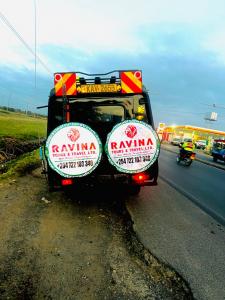Ravina Tours Reveals 2026 Safari Rates for Kenya & Tanzania – Here’s What to Expect
With Safari Travel Surging, New Data-Backed Packages Aim to Balance Adventure, Affordability, and Safety
NAIROBI, KENYA, August 5, 2025 /EINPresswire.com/ -- As international travelers prioritize once-in-a-lifetime journeys, African safaris are experiencing a strong resurgence. Yet one question continues to dominate search engines, social platforms, and travel forums alike: “How much does a 2-week African safari cost?”In response to rising demand and evolving traveler preferences, Ravina Tours& Travel, one of East Africa’s most trusted safari specialists, has unveiled its 2026 two-week safari packages across Kenya and Tanzania. These new itineraries aim to answer top traveler concerns around pricing, experience quality, and destination choice.
How Much Does a 2-Week African Safari Cost in 2026?
Ravina estimates that a complete two-week safari in 2026 will cost between $3,800 and $6,500 per person, depending on:
The country (Kenya, Tanzania, or a combination)
Accommodation level (standard lodges, luxury tented camps, or ultra-luxury options)
Transport mode (road transfers or fly-in safaris)
Season of travel (peak Great Migration months vs. low season)
For US based travelers, the average spend is projected at £3,500 to £5,500, including flights, when booked several months in advance.
“There’s a common misconception that African safaris are only for the wealthy,” says Claire Bolei, Head of Product at Ravina Tours. “In reality, with smart planning and a trusted operator, a 2-week safari can be incredibly rewarding—both in experience and in value.”
What’s Included in Ravina’s 2-Week Safari Packages
The new 14-day itineraries are crafted to provide diverse, authentic, and immersive safari experiences suitable for couples, families, and solo adventurers alike. Key inclusions are:
Multi-day game drives in Maasai Mara, Serengeti, and the Ngorongoro Crater
Wildlife viewing in Amboseli, Lake Manyara, and Tarangire National Parks
Guaranteed Big Five sightings (lion, leopard, elephant, buffalo, rhino)
Cultural visits to Maasai villages and interactions with the Hadzabe tribe in Tanzania
Optional Zanzibar beach extension for relaxation after safari
Carefully selected eco-lodges and luxury tented camps with full-board meals
All park fees, domestic flights, ground transport, and airport transfers
Travelers can choose country-specific safaris or explore both Kenya and Tanzania through combo packages, ideal for witnessing the Great Wildebeest Migration in multiple stages.
Top Safari Planning Questions Answered
Using data insights from Google Trends and direct client inquiries, Ravina structured its offerings to address real concerns travelers have when planning an African safari.
What is the best month to go on a safari?
July to October is ideal for the wildebeest migration and river crossings in the Maasai Mara and Serengeti. December to March is perfect for calving season and predator sightings.
Is two weeks too long or short for safari?
Two weeks is considered the ideal duration allowing enough time to visit multiple parks, experience cultural immersion, and enjoy downtime without rushing.
How far in advance should one book?
Ravina recommends booking 6–9 months ahead, especially for travel between July and September, which sells out quickly due to migration demand.
Which is better for safari—Kenya or Tanzania?
Both are world-class safari destinations. Kenya is known for the Masai Mara, while Tanzania’s Serengeti and Ngorongoro Crater offer unmatched landscapes. Ravina’s cross-border itineraries allow you to experience the best of both.
Is it safe to travel?
Yes, both Kenya and Tanzania are tourist-friendly countries. Ravina ensures traveler safety through licensed guides, 24/7 support, vetted accommodations, and adherence to international standards.
Why Book With Ravina Tours?
Founded and operated in Kenya, Ravina Tours combines expert knowledge, sustainable practices, and personalized service. Every safari is led by certified, English-speaking guides with wildlife and cultural training.
In addition to top-tier client satisfaction, Ravina is committed to ethical travel. Every booking supports local conservation projects, women-led tourism cooperatives, and Maasai community initiatives.
Clients also benefit from flexible customization, transparent pricing, and responsive customer service throughout their journey.
Early Booking Offers Now Open
Travelers who secure their 2026 safari packages before December 31, 2025, can save up to 15% off select itineraries. Flexible payment plans, small group rates, and tailored luxury options are also available.
For sample itineraries, custom quotes, or bookings:
Accounts Receivable Outsourcing Services Support Financial Clarity Across U.S. Healthcare
American Receivable Celebrates 46 Years of Success and Steady Leadership
Global Ready-Mix Concrete Market Is Expected to Reach $704.2 Billion by 2030: Says AMR
Więcej ważnych informacji
 Jedynka Newserii
Jedynka Newserii

 Jedynka Newserii
Jedynka Newserii

Polityka

D. Joński: Nie wiemy, co zrobi Rosja za dwa–trzy lata. Według duńskiego wywiadu może zaatakować kraje nadbałtyckie i musimy być na to gotowi
Zdecydowana większość krajów unijnych wskazuje na potrzebę wzmocnienia zdolności obronnych Europy w obliczu coraz bardziej złożonego geopolitycznego tła. Wywiady zachodnich państw wskazują, że Rosja może rozpocząć konfrontację z NATO jeszcze przed 2030 rokiem. Biała księga w sprawie obronności europejskiej „Gotowość 2030” zakłada m.in. ochronę granic lądowych, powietrznych i morskich UE, a sztandarowym projektem ma być Tarcza Wschód. – W budzeniu Europy duże zasługi ma polska prezydencja – ocenia europoseł Dariusz Joński.
Transport
Duże magazyny energii przyspieszą rozwój transportu niskoemisyjnego w Europie. Przyszłością może być wodór służący jako paliwo i nośnik energii

Zmiany w europejskim transporcie przyspieszają. Trendem jest elektromobilność, zwłaszcza w ramach logistyki „ostatniej mili”. Jednocześnie jednak udział samochodów w pełni elektrycznych w polskich firmach spadł z 18 do 12 proc., co wpisuje się w szerszy europejski trend spowolnienia elektromobilności. Główne bariery to ograniczona liczba publicznych stacji ładowania, wysoka cena pojazdów i brak dostępu do odpowiedniej infrastruktury. – Potrzebne są odpowiednio duże magazyny taniej energii. Przyszłością przede wszystkim jest wodór – ocenia Andrzej Gemra z Renault Group.
Infrastruktura
W Polsce w obiektach zabytkowych wciąż brakuje nowoczesnych rozwiązań przeciwpożarowych. Potrzebna jest większa elastyczność w stosowaniu przepisów

Pogodzenie interesów konserwatorów, projektantów, inwestorów, rzeczoznawców i służby ochrony pożarowej stanowi jedno z największych wyzwań w zakresie ochrony przeciwpożarowej obiektów konserwatorskich. Pożary zabytków takich jak m.in. katedra Notre-Dame w Paryżu przyczyniają się do wprowadzania nowatorskich rozwiązań technicznych w zakresie ochrony przeciwpożarowej. W Polsce obowiązuje już konieczność instalacji systemów detekcji. Inwestorzy często jednak rezygnują z realizacji projektów dotyczących obiektów zabytkowych z uwagi na zmieniające się i coraz bardziej restrykcyjne przepisy czy też względy ekonomiczne.
Partner serwisu
Szkolenia

Akademia Newserii
Akademia Newserii to projekt, w ramach którego najlepsi polscy dziennikarze biznesowi, giełdowi oraz lifestylowi, a także szkoleniowcy z wieloletnim doświadczeniem dzielą się swoją wiedzą nt. pracy z mediami.




![Nestlé w Polsce podsumowuje wpływ na krajową gospodarkę. Firma wygenerowała 0,6 proc. polskiego PKB [DEPESZA]](https://www.newseria.pl/files/1097841585/fabryka-nesquik_1,w_85,r_png,_small.png)




.gif)

 |
| |
| |
|